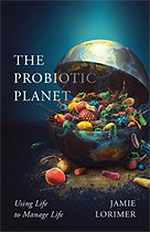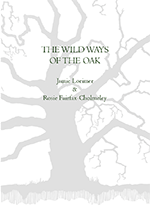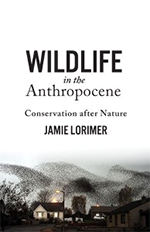Professor Jamie Lorimer
Professor of Environmental Geography
Fellow of Hertford College, Oxford
Professor of Environmental Geography
Fellow of Hertford College, Oxford
Academic Profile
Jamie is an environmental geographer whose research examines the production of environmental knowledge, and how this knowledge comes to shape the world around us. He focuses on powerful understandings of Nature and their consequences for human and nonhuman life across different spatial scales. Past projects have examined human relations with a range of organisms - from elephants to hookworms - and policy domains - including conservation, health, and agriculture. He combines concepts and approaches from more-than-human geography with those from science studies, using ethnographic, participatory, and historical methods. His research has been funded by the ESRC, The British Academy and the Wellcome and Leverhulme Trusts, amongst other sources.
Jamie joined the School of Geography and the Environment in October 2012. He has a BSc (Hons, first class) and a PhD in Geography from the University of Bristol. Prior to coming to Oxford, he lectured for four years at Kings College London.
Current Research
Jamie's current research spans four broad and connected areas:
The histories, cultures and politics of wildlife conservation
Jamie's early work examined the role of 'nonhuman charisma' in shaping the scope, ethics, and political economy of nature conservation. He traced how some species and spaces are favoured in conservation science and management and explored the ecological and political implications of these partialities in the UK and in South Asia.
Subsequent work examined the rise of rewilding and then nature recovery as new modes of nature conservation, noting the shift from a focus on rare species to ecological processes and landscape connections. He drew these interests together in his first monograph, entitled Wildlife in the Anthropocene, which examines conservation after the end of the modern understanding of Nature: as cut off from Society and revealed by objective Natural Science. It provides a new framework that grounds conservation in unruly and hybrid ecologies, which locates scientific and economic decision making in their cultural and political contexts, and which advocates for multispecies conviviality. Jamie continues to explore the social dimensions of conservation through his involvement in The Leverhulme Centre for Nature Recovery.
The governance of the microbiome and health
In his work on rewilding Jamie tracked how ecological metaphors from conservation biology moved into the sciences of microbial ecology and immunology as scientists developed tools for mapping the microbiome. Following the emergence of this field, Jamie examined how scientists and citizen are turning to microbiology to understand the pathological consequences of the loss of microbial diversity, the rise of microbial 'dysbiosis', and the emergence of new pathogens. They are introducing microbes to manage ecologies and to secure health. He mapped a relational and deeply unequal geography of microbial health, in which disease emerges from both microbial excess and microbial absence.
To enable this research, Jamie developed (with colleagues) an interdisciplinary and participatory methodology for engaging publics with the microbiome. In the Good Germs project, he collaborated with a group of households in Oxford to take the technologies of next generation sequencing out of the laboratory to help people visualize their domestic microbiome and to conduct their own domestic hygiene experiments. Jamie is a fellow of the Canadian Institute for Advanced Research programme on Humans and the Microbiome.
Jamie has drawn this work together in his second monograph, entitled The Probiotic Planet: Using life to manage life. It combines his interests in rewilding, the microbiome and biome restoration argue that a probiotic turn is underway in the management of life across a range of scales and policy domains. Scientists and policy makers are using life to manage life: reintroducing species and ecological processes to address the problems caused by the excessive application of antibiotic approaches.
Livestock, regenerative agriculture, and the rise of plant-based eating
Since 2018 Jamie has been leading a work package in the Livestock, Environment and People programme. In collaboration with Tara Garnett and several postdoctoral researchers, he is examining food system responses to the growing awareness of the links between livestock agriculture and climate change. This includes research with Alex Sexton on the rise of alternative proteins and the growth in plant-based eating in Europe and North America: tracing the emergence of a new model of 'Big Veganism'. It also includes work with George Cusworth on the promise and pitfalls of regenerative agriculture, a probiotic model of 'nature-based' farming that is growing in popularity. This research critically examines these alternative food futures, tracing the political economic implications of the growing shift towards meat and dairy alternatives.
Animals' Geographies
In the last fifteen years Jamie has published a series of papers with colleagues and PhD students developing the sub-disciplinary field of animals' geographies. This work takes animals seriously as geographical actors, exploring how they make and inhabit places. They have outlined and deployed methodologies for attending to the lived experiences of animals, and for witnessing and evoking animals' worlds. They have explored how key concepts from human geography (like atmospheres, mobilities, territories and the urban) enable novel analyses of animals' worlds, and how attending to animals themselves offers new insights for human geography.
Teaching and Supervision
Undergraduate
Jamie lectures on the Prelims 'Human Geography' course, the Final Honour School 'Environmental Geography' foundation course. Jamie convenes an FHS option with Beth Greenhough, 'Geographies for the Anthropocene, based on their research.
At Hertford College, Jamie and his colleagues are responsible for teaching students across the entire breadth of geographical topics for the Preliminary Examination and Final Honour School of Geography.
Postgraduate
Jamie is the Academic Director for the MSc in Nature, Society and Environmental Governance course. He convenes and teaches on the 'Nature and Society' core course for this MSc. Jamie also co-teaches a module on 'Conservation and Society' on the MSc in Biodiversity, Conservation and Management.
Jamie welcomes enquiries from individuals wishing to undertake doctoral or post-doctoral research in the four research areas outlined above, or related topics including: the histories, geographies, cultures and politics of wildlife conservation, including rewilding; animal geographies; the social dimensions of the microbiome, sustainable transitions in food and agriculture. Jamie and Beth Greenhough run the More-Than-Human Geographies reading group and seminar series.
Current Graduate Research Students
| Wallerand Bazin | Recovering natures in UNESCO cultural landscapes: Towards a Rancierian politics of knowledge, land and aesthetics |
| Annika Bowman | In the Wake of Dead Ice: Glacial Remains in Iceland |
| Jennifer Dodsworth | Locating Communities in Digital Natures: Exploring the Politics of National Parks, Identity and Visual Social Media in the Lake District. |
George Kirkham | The Viper and the Palm: space, immunity, and health in the governance of snakebite in Costa Rica |
| Kat Rahmat | Elephant Time: Multi-Temporality as Attunement with More-Than-Human Others |
| Nick Sidwell | eDNA and the epistemics of biodiversity data: material technologies, data regimes, and environmental governance |
Recent Graduate Research Students (since 2012)
| Oscar Hartman Davies | Ocean Sentinels: Seabirds and smart oceans governance in the Southern Hemisphere |
| Dong-Li Hong | Atmosphere as a means of governing life: weather modification and ecological conservation in Sanjiangyuan, China |
| Theo Stanley | The epistemic politics of nature-based solutions: Knowing carbon in Scottish land governance |
| Annie E.A. Welden | Animal Infrastructure: The animals enrolled as Nature-based Solutions |
| Joshua Evans | Taste Shaping Natures: A multimodal ethnography of translated fermentation in the New/er Nordic Cuisine |
| Filipa Soares | Contesting the wild: nature, rewilding, conservationists and local communities in a changing Europe |
| Kelsi Nagy | India's sacred and mundane cattle: gods, hybrid-beasts and scavengers |
| Cyrus Nayeri | Governing the ungovernable: investigating the geopolitics of volcano hazard management on Iceland's South Coast |
| Alex Littaye | Finding time in the geographies of food: how heritage food discourses shape notions of place |
Selected Publications
(Please contact me if you can not get access to any of these publications)








